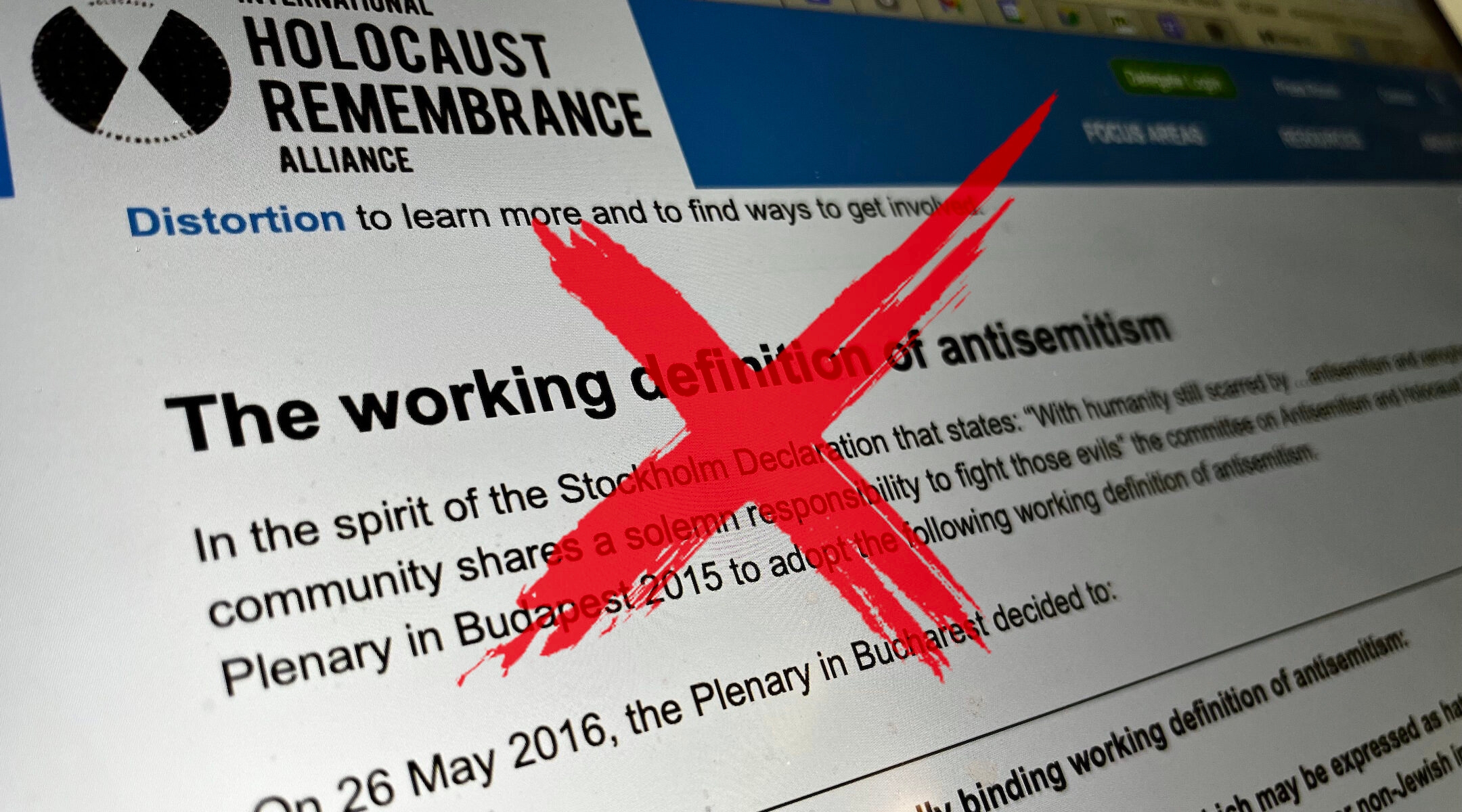(JTA) — As the Biden administration nears the long-awaited announcement of its National Strategy to Counter Antisemitism, tensions have emerged over what definition of antisemitism the White House will use. According to Jewish Insider, “major mainstream Jewish groups” are battling against the “left” to define antisemitism, suggesting that the groups’ preferred definition, that of the International Holocaust Remembrance Alliance, is the mainstream one.
The framing determines a winner before the contest even begins — this is the power play of the term “mainstream.”
Here’s how it works: A purportedly neutral source — Jewish Insider, say, or the Associated Press — names a set of players as the “mainstream.” Without any discussion of method or sources, the characterization produces reality. The self-fulfilling designation allows a select group of organizations to command the center. These groups and their spokespeople then use their “mainstream” power to naturalize and normalize their own agenda, like defining the IHRA definition as the “gold standard” despite concerns that it chills legitimate criticism of Israel, or condemning “progressive” voices for their refusal to conflate anti-Zionism and antisemitism, or chastising Rep. Rashida Tlaib for commemorating the Nakba, the “catastrophe” that befell her people with the creation of Israel.
Game on.
The strategy of claiming the center to control it is nothing new. In the annals of American Jewish institutional formation, it’s happened again and again. Just witness the names of organizations: the Union of American Hebrew Congregations, the Central Conference of American Rabbis, the American Jewish Committee, the Zionist Organization of America, and the list could go on and on. One after the other, these groups have claimed to be the center, the “mainstream.”
RELATED: The IHRA definition of anti-Semitism and why people are fighting over it, explained (2021)
As a historian who has written about many of these groups, I can tell you that every claim to be the united front, the central address, the singular American Jewish organization has rested on the surety that most American Jews believed no such thing. Indeed, words that posture such a “mainstream” are best read as indicators of dissent, debate and fracture.
When it comes to confronting antisemitism, some of today’s Jewish leaders might imagine that American Jews can achieve unity that has long eluded them or Jewish institutional life. They might be so certain of this vision as to pretend that it is true, with fundraising and media blitzes that appear to speak on behalf of all Jews. Slick advertising campaigns, whether on television and social media or highway billboards, and a hotly contested and poorly constructed yet exclusive definition of antisemitism may make it seem that the Jewish “mainstream” speaks as one, loudly for all Jews and all people who care about fighting antisemitism.
But don’t let the powerplay bulldoze you. Those television and social media blitzes? They are the product of one megadonor’s imagination and thick wallet. The pink highway signs that deliver glib “lessons” against antisemitism in the form of snark? They are brought to you by the same high-net-worth family that advertised its storage company with similarly cheeky taglines. And even the creation of and campaigns to endorse the IHRA definition have specific histories and funding sources.
None of this is to say that those efforts should be dismissed because they have histories and are tied to narrow but deep pockets of wealth. The problem comes when those histories and sources of power go unacknowledged and instead parade themselves as the “mainstream,” the authentic truth of what all Jews must believe.
RELATED: The White House intends to fight antisemitism. That starts with a sensible definition. (Opinion)
In the power plays to claim the Jewish “mainstream,” institutions and their leaders are trying to silence those who disagree with their policies and politics. The term “mainstream” acts as a cudgel against efforts to build solidarity between Palestinians and Israelis who oppose the actions of the Israeli government. Its purveyors vocally and consistently defend harsh anti-boycott laws, on the books in several American states, that penalize institutions or individuals for engaging in or promoting boycotts against Israel. Or they helicopter onto American college campuses to pressure university administrators to subscribe to the IHRA definition of antisemitism.
Instead of arriving at the field ready to play an honest game, “mainstream” Jewish institutions and their leaders want to be the only players. To argue that we must all agree on one definition in order to talk about antisemitism is like clearing the field before the game even begins.
Because this is more than a game — because hatred and bigotry fuel violent crimes at an alarming rate in the United States — Jewish and non-Jewish people who have a stake in the conversation about antisemitism should refuse to play. Publications that insist on anointing a “mainstream” ought to be called out. And the press, instead, should investigate the role that some of its agents play in advancing the power play of the “mainstream” — including, for example, Jewish Insider, which is less than transparent about its own history and sources of funding.
As a participant in one of the “listening sessions” convened by the White House in February of this year, I can report that the scholars who joined me around the table (OK, Zoom screen) had a wide range of perspectives. When asked to share our views on antisemitism, none of us got to call ourselves the “mainstream” expert on the questions. Instead, we identified the methods, sources and theories that authorized our understandings of the roots and manifestations of antisemitism.
I can only hope that the other listening sessions and the White House process has proceeded accordingly, with little reverence for the self-appointed Jewish “mainstream.” A resolve to understand the diversity of views and what led people or groups to them will upset any single view — or definition. A successful strategy will not be cowed by the “mainstream” but instead will highlight the varieties of truly and authentically held ideas that together can animate efforts to stem the tide of antisemitism and bigotry.
JTA has documented Jewish history in real-time for over a century. Keep our journalism strong by joining us in supporting independent, award-winning reporting.







